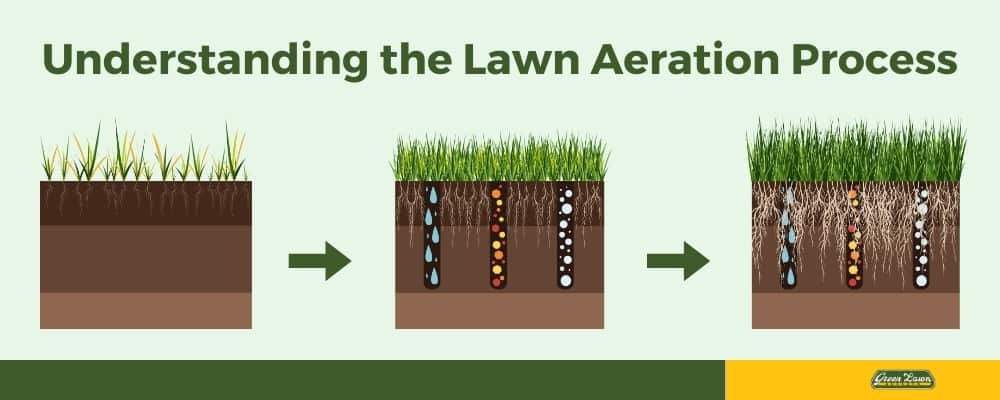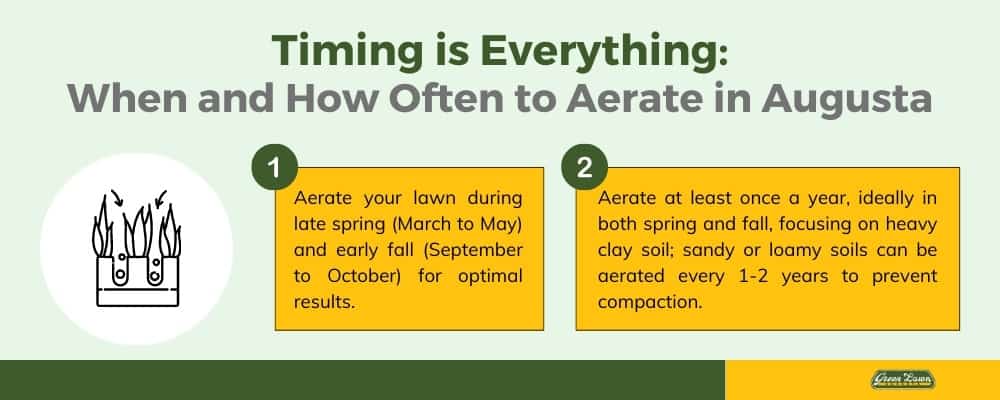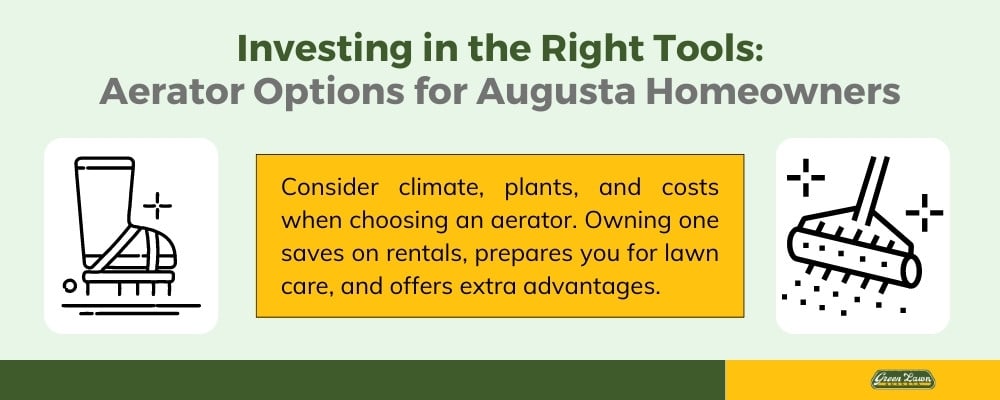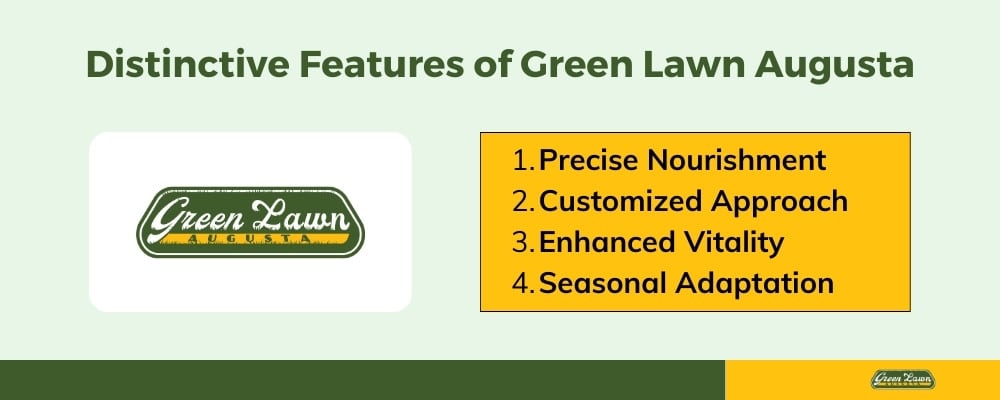You might be wondering about lawn aeration in our climate. Like Augusta’s renowned azaleas, your lawn requires tender, loving care to flourish optimally.
We’ve compiled all the essential information about lawn aeration in Augusta, encompassing the understanding of the procedure, selection of appropriate tools, and perfect timing.
Table of Contents
ToggleUnderstanding the Lawn Aeration Process

Prepare to dig deep into the scientific aspects of lawn aeration, a process as essential to an Augusta lawn’s well-being as sunlight is to a sunny day.
Our region’s distinct plant life, soil conditions, and seasons make comprehending proper aeration methods imperative.
The Science Behind Lawn Aeration
Aeration directly combats soil compaction due to foot traffic and mowing. It improves nutrient absorption for the local plants.
To aerate your lawn, an aerator tool is used to extract small soil cores from your yard. This helps in loosening compacted areas and enhancing oxygen availability at the grassroots.
The timing of lawn aeration is essential. The optimal periods in Augusta are early spring or fall due to the climate and seasonal changes. These times offer the perfect conditions for root development after aeration.
It’s important to note that aeration should ideally be done before a watering or rainfall event. This ensures maximum water infiltration and prevents runoff.
Choosing Between DIY and Professional Aeration
You’re in difficulty, weighing up the options of tackling lawn aeration yourself or outsourcing it to professionals such as ‘Green Lawn Augusta.’
Given Augusta’s distinct climate and soil composition, both alternatives have advantages.
Opting for the DIY approach necessitates a deep understanding of local plant life and proficiency in aeration techniques.
On the other hand, Professional lawn services have expertise in caring for Augusta’s changing seasons.
The DIY Approach: How to Aerate Lawn Yourself
You can aerate your lawn, yet be aware that this DIY method demands considerable time and physical exertion.
Utilizing a lawn aerator can significantly improve soil conditions for your local plant life in Augusta.
Yet, understanding the frequency of lawn aeration is essential. If uncertain, consider your area’s climate variability or consult a nearby lawn aeration service for advice.
The Pros of Hiring a Professional: Spotlight on ‘Green Lawn Augusta’
Engaging ‘Green Lawn Augusta’ for professional lawn treatment services can significantly transform your yard. They present outstanding proficiency and equipment to make your lawn the talk of the town.
Lawn aeration service features:
- Offering lawn aerators for purchase.
- In-depth understanding of Augusta’s plant life and soil conditions.
- Providing seasonal lawn aeration services.
- Mastery of Augusta’s climate changes.
Following this, we will explore ‘the impact of timing: when and how often to aerate in Augusta.’
Timing is Everything: When and How Often to Aerate in Augusta

It’s vital to comprehend when and how frequently to aerate your lawn to ensure its prosperity despite the changing seasons.
We will determine the most suitable time to aerate lawns in Augusta based on various local factors.
Deciphering the Best Time to Aerate the Lawn
Identifying the optimal time to aerate your lawn in Augusta requires a thorough understanding of the grass type and the local climatic conditions.
Augusta’s seasonal climate changes must be understood for effective aeration timing.
Here’s what you need to consider:
- Grass Type: If your lawn sports warm-season grasses such as Bermuda or Zoysia, the best aeration time would be late spring to early summer when they thrive.
- Soil Conditions: The clayey soil in Augusta is prone to compaction, making routine aeration necessary for maintaining a healthy lawn.
- Local Climate: Augusta experiences hot summers and mild winters, so avoiding aeration during extreme temperatures that could stress your grass is important.
- Recovery Time: Ensure sufficient recovery time after aeration before the grass’s peak growth period concludes.
Determining Aeration Frequency
With its clay-based soil that compacts easily, Augusta requires aerating lawns twice a year, as aeration frequency depends on soil type, lawn usage, and regional factors.
On the other hand, aerate sandy soil every two years, but high-traffic areas need more frequent aeration to reduce compaction.
Augusta’s climate also influences aeration frequency, as hot summers and cold winters can stress the grass, necessitating additional aeration for improved water absorption and nutrient uptake.
Investing in the Right Tools: Aerator Options for Augusta Homeowners

Whether examining various aerator styles or deciding between purchasing and renting one, it’s crucial to consider all aspects, including our local climate and plant life.
Let’s investigate these crucial factors, guiding you to a well-informed choice that will result in a flourishing, verdant lawn all year round.
Exploring Types of Lawn Aerators
Your selection should be based on your soil’s composition for maintaining healthy and vibrant grass in Augusta, Augusta’s climatic conditions, and your lawn’s specific requirements.
- Spike Aerators: These are straightforward tools that create holes in the ground, making them suitable for well-draining sandy soils.
- Plug Aerators: These devices extract soil cores from the ground, making them the best fit for the clay-based soils common in Augusta.
- Liquid Aerators: These are ideal for Augusta’s scorching summer months when traditional aeration methods may cause stress to your lawn.
- Tow-Behind Aerators: These are beneficial for expansive lawns or when dealing with soil compaction due to high foot traffic.
Remember the importance of understanding your soil type and seasonal shifts when considering aeration solutions in Augusta.
Benefits of Owning Your Aerator
Having your aerator saves on rental costs and prepares you for lawn care tasks. Additional advantages include:
- Acquaintance with the equipment, resulting in uniform outcomes.
- Understanding of Augusta’s unique soil characteristics and plant life.
- Capability to adjust to the changing seasonal aeration requirements.
- Quickness in addressing sudden lawn problems.
Augusta’s Lawn Care Landscape: Embracing Professional Care

Do you appreciate the importance of correct aeration techniques and the seasonal variations we experience to maintain a vibrant, green landscape?
Why not broaden your lawn care approach with ‘Green Lawn Augusta? Their professional expertise could be the essential element to boost the health and aesthetics of your yard.
Expanding Your Lawn Care Horizons with ‘Green Lawn Augusta’
Choosing ‘Green Lawn Augusta’ for your Augusta lawn care needs could be the most beneficial choice for your garden this year. Their comprehensive understanding of local plants, soil, and Augusta’s climate and seasonal changes is impressive.
Here are four aspects that make ‘Green Lawn Augusta’ distinctive:
- Their extensive knowledge of local flora ensures the accurate nourishment of each grass strand.
- Their deep insight into Augusta’s soil conditions enables them to customize their approach for each lawn.
- Their aeration techniques enhance root vitality and increase water uptake.
- Their grasp of Augusta’s climatic shifts allows them to adjust their services per season.
Conclusion: Augusta’s Path to Lawn Perfection Through Aeration
In conclusion, a perfect Augusta lawn requires more than mowing and watering. It needs patience and an understanding of the climate and clay soil. Consistent aeration makes that soil more receptive, slowly transforming the landscape.
You also now understand the necessity of utilizing the appropriate equipment—a core aerator is your best option. This tool extracts small soil cores instead of simply creating holes in the ground.

